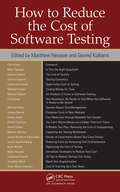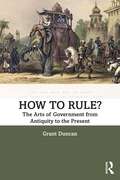- Table View
- List View
How to Raise a Family on Less Than Two Incomes
by Denise M. TopolnickiMany parents today believe that two steady incomes are not only desirable but absolutely necessary in order to raise a family. Yet most full-time working mothers say that if it weren't for the money, they would not work, and instead would stay at home with their children. After the birth of her second child, Denise Topolnicki faced this common dilemma: Continue working full-time, or spend more time with her family? As a former editor ofMoney, Denise used her financial expertise and discovered that she ...
How to Read Nonprofit Financial Statements: A Practical Guide
by Andrew S. Lang Lee Klumpp Tammy Ricciardella William D. EisigEXPERT GUIDANCE ON HOW TO READ, INTERPRET, AND USE NONPROFIT FINANCIAL STATEMENTS—UPDATED FOR THE NEW FASB STANDARD RELATED TO NONPROFIT FINANCIAL REPORTING (ASU 2016-14) If you're an executive or volunteer leader at a nonprofit who is unfamiliar with the formats and language of financial statements, this book fills you in on how to read and correctly interpret those critical documents. If you're a seasoned pro who wants to brush up on your skills while familiarizing yourself with the latest FASB nonprofit reporting standards, this is the only guide you need. The intent behind creating the ASU 2016-14 was to improve the clarity and usefulness of nonprofit financial statements, but making sense of those statements can still be tough going for the uninitiated. Accountants and non-accountants alike who use and prepare nonprofit financial statements need guidance on how to interpret and implement the new FASB standard. Written for both audiences, this book: Clearly defines accounting terminology and concepts, while offering numerous examples of financial statements reflecting both the old and new FASB standards Steers you, line-by-line, through financial reports, providing explanations of differences between the old and new standards Provides numerous illustrations that help you quickly feel at home with the format of nonprofit financial statements Offers exercises that help you gain insight into the concepts surrounding nonprofit financial statements and reinforce your command of those concepts How to Read Nonprofit Financial Statements, Third Edition is an invaluable resource for everyone who reads, interprets, or prepares those all-important documents.
How to Read a Financial Report
by John A. Tracy Tage TracyAn updated new edition of the comprehensive guide to reading and understanding financial reportsFinancial reports provide vital information to investors, lenders, and managers. Yet, the financial statements in a financial report seem to be written in a foreign language that only accountants can understand. This new Eighth Edition of How to Read a Financial Report breaks through that language barrier, clears away the fog, and offers a plain-English user's guide to financial reports. This updated edition features new information on the move toward separate financial and accounting reporting standards for private companies, the emergence of websites offering financial information, pending changes in the auditor's report language and what this means to investors, and requirements for XBRL tagging in reporting to the SEC, among other topics.Makes it easy to understand what financial reports really sayUpdated to include the latest information financial reporting standards and regulatory changesWritten by an author team with a combined 50-plus years of experience in financial accountingWith this new edition of How to Read a Financial Report, investors will find everything they need to fully understand the profit, cash flow, and financial condition of any business.
How to Read a Financial Report Workbook: Wringing Vital Signs Out of the Numbers
by Tage C. TracyRead and understand financial reports like an expert, including the “big three” financial statements Accompanying the new 10th edition of How to Read a Financial Report, How to Read a Financial Report Workbook provides hands-on exercises and active tools that teach readers not just how to read, analyze, and interpret a variety of financial reports but in addition, provides bonus material related to better understanding the types of capital used by companies to support business growth. To explain concepts in an easy-to-understand way, this book is lighter on text and instead features a wealth of exhibits and accompanying companion exhibits to first showcase various scenarios and then compare two scenarios using different assumptions. This workbook also includes “in the trenches” content that enables readers to equate key concepts with commonly used “street” language in finance. In this workbook, readers will learn and expand their knowledge with: Cash flows & capital sources, financial condition (i.e., the balance sheet), and profit performance reports (AKA the “big three” financial statements) Balance sheets, income statements, financial ratio analyzes, and statements of changes in shareholder equity Typical financial statement line items including earned sales revenue, costs of sales revenue, operating expenses, EBITDA, income taxes, accounts receivable, inventory, capital and other long-term assets, accounts payable, accrued liabilities, short-term debt, deferred revenue, long-term debt, and types of equity capital Most commonly used accounting and finance terminology, enabling you to speak the language of business finance Bonus material that covers key concepts with understanding capital sources, the capital table (i.e., cap table), and the critically important cap stack How to Read a Financial Report Workbook is a helpful interactive learning resource that can be used every day by investors, lenders, business leaders, analysts, and managers seeking to enhance their career path and upward mobility by gaining more knowledge in understanding financial information and performances.
How to Read a Financial Report: Wringing Vital Signs Out of the Numbers
by John A. Tracy Tage C. TracyThe updated new edition of the comprehensive guide to reading and understanding financial reports Financial reports are used to provide a range of vital information, including an organization’s cash flow, financial condition, and profit performance (aka The Big Three Financial Statements). Financial statements are often complex and extremely difficult to understand for anyone other than accounting and finance professionals. How to Read a Financial Report enablesinvestors, lenders, business leaders, analysts, and managers to read, analyze, and interpret financial accounting reports. Designed specifically for non-specialists, this reader-friendly resource covers the fundamentals of financial reporting in jargon-free English. Topics such as sales revenue & recognition, costs of goods sold, sources & uses of capital/cash, non-cash expenses (e.g., depreciation expense), income tax obligations, understanding profits & financial stability, and financial statement ratios & analysis are covered throughout the book. Now in its ninth edition, this bestselling guide has been thoroughly revised to reflect changes in accounting and financial reporting rules, current practices, and recent trends. New and expanded content explains managing cash flow, illustrates the deceitful misrepresentation of profits in some financial reports (aka Financial Engineering), and more. Further, end-of-chapter activities help readers learn the intricacies of the balance sheet and cash flow statement, while updated sections address shifts in regulatory standards. Written by two highly experienced experts in financial accounting, this resource: Enables readers to cut through the noise and focus on what financial reports and financial statements are really saying about a company Clarifies commonly misunderstood aspects of financial reporting and how companies can “financially engineer” operating results Offers comprehensive, step-by-step guidance on analyzing financial reports Provides numerous examples and explanations of various types of financial reports and analysis tools
How to Read a Financial Report: Wringing Vital Signs Out of the Numbers
by Tage C. TracyLearn how to read, understand, analyze, and interpret different types of financial reports In the newly revised and updated 10th Edition of How to Read a Financial Report, seasoned accounting, financial, and business consultant Tage C. Tracy guides readers through reading, understanding, analyzing, and interpreting various types of financial reports, including cash flow, financial condition, and profit performance reports. This book also reveals the various connections between different financial metrics, reports, and statements, discusses changes in accounting and finance reporting rules, current practices, and recent trends, and explains how financial information can be manipulated, such as through inclusion or omission of certain KPIs. This bestselling guide uses jargon-simplified and easy-to-understand language to make the information accessible to all, regardless of finance or accounting background. Updates to the 10th Edition include: Relevant terminology and issues critical to understand in today's economic environment. New material on loans, debt, and using financial reports and statements to understand performance. The connection of capital including debt and equity to the income statements and cash flow statements. Expanded financial analysis tools and ratios that provide a deeper understanding of a company's financial performance and strength. A more in-depth overview of how company's may engineer financial results and how understanding cash flows can help root out fraud. An essential all-in-one guide on the art of reading a financial report and avoiding common pitfalls and misconceptions, How to Read a Financial Report earns a well deserved spot on the bookshelves of all business leaders and investors who want to be able to read and understand financial reports and statements like a professional.
How to Recruit, Incentivize and Retain Millennials
by Dheeraj Sharma‘What do millennials want?’ is a big question facing organization these days. HR managers are looking for recruitment strategies that can help achieve the optimal person–organization fit. Several organizations have already started implementing innovative practices to attract and retain millennials. They are unique in their characteristics and consumption pattern. Millennials are known to have forced several organization to adapt the workplace and work environment. Their varied ways of life are also reflected in their work settings. Millennials enter the workforce with unique needs, characteristics, expectations and personalities. These differences pave the way for new challenges that contemporary organizations encounter on a regular basis. This book demystifies the problems faced by HR managers and recruiters when hiring and working with millennials. It offers descriptive and prescriptive insights on leveraging the millennial talent.
How to Reduce Workplace Conflict and Stress: How Leaders and Their Employees Can Protect Their Sanity and Productivity from Tension and Turf Wars
by Anna MaravelasThis book helps executives, supervisors, and managers-and the people that work for them-protect pride, profit and productivity from the disabling emotions like hostility, desk-rage, and workplace incivility.
How to Reduce the Cost of Software Testing
by Matthew Heusser Govind KulkarniPlenty of software testing books tell you how to test well; this one tells you how to do it while decreasing your testing budget. A series of essays written by some of the leading minds in software testing, How to Reduce the Cost of Software Testing provides tips, tactics, and techniques to help readers accelerate the testing process, improve the performance of the test teams, and lower costs.The distinguished team of contributors—that includes corporate test leaders, best paper authors, and keynote speakers from leading software testing conferences—supply concrete suggestions on how to find cost savings without sacrificing outcome. Detailing strategies that testers can immediately put to use to reduce costs, the book explains how to make testing nimble, how to remove bottlenecks in the testing process, and how to locate and track defects efficiently and effectively.Written in language accessible to non-technical executives, as well as those doing the testing, the book considers the latest advances in test automation, ideology, and technology. Rather than present the perspective of one or two experts in software testing, it supplies the wide-ranging perspectives of a team of experts to help ensure your team can deliver a completed test cycle in less time, with more confidence, and reduced costs.
How to Resist Amazon and Why: The Fight for Local Economics, Data Privacy, Fair Labor, Independent Bookstores, and a People-Powered Future!
by Danny CaineWhen a company's workers are literally dying on the job, when their business model relies on preying on local businesses and even their own vendors, when their CEO is the richest person in the world while their workers make low wages with impossible quotas... wouldn't you want to resist? Danny Caine, owner of Raven Book Store in Lawrence, Kansas has been an outspoken critic of the seemingly unstoppable Goliath of the bookselling world: Amazon. In this book, he lays out the case for shifting our personal money and civic investment away from global corporate behemoths and to small, local, independent businesses. Well-researched and lively, his tale covers the history of big box stores, the big political drama of delivery, and the perils of warehouse work. He shows how Amazon's ruthless discount strategies mean authors, publishers, and even Amazon themselves can lose money on every book sold. And he spells out a clear path to resistance, in a world where consumers are struggling to get by. In-depth research is interspersed with charming personal anecdotes from bookstore life, making this a readable, fascinating, essential book for the 2020s.
How to Resist Amazon and Why: The Fight for Local Economics, Data Privacy, Fair Labor, Independent Bookstores, and a People-Powered Future! (Real World)
by Danny CaineWhen a company's workers are literally dying on the job, when their business model relies on preying on local businesses and even their own vendors, when their CEO is the richest person in the world while their workers make low wages with impossible quotas... wouldn't you want to resist? Danny Caine, owner of Raven Book Store in Lawrence, Kansas has been an outspoken critic of the seemingly unstoppable Goliath of the bookselling world: Amazon. In this book, he lays out the case for shifting our personal money and civic investment away from global corporate behemoths and to small, local, independent businesses. Well-researched and lively, his tale covers the history of big box stores, the big political drama of delivery, and the perils of warehouse work. He shows how Amazon's ruthless discount strategies mean authors, publishers, and even Amazon themselves can lose money on every book sold. And he spells out a clear path to resistance, in a world where consumers are struggling to get by. In-depth research is interspersed with charming personal anecdotes from bookstore life, making this a readable, fascinating, essential book for the 2020s.
How to Resolve Conflict in Organizations: The Power of People Models and Procedure
by Annamaria GardenThis is a comprehensive guide using People Models to understand and resolve conflict at different levels of the organization. It starts at the inter-organizational level explaining conflict between organizations that are involved in mergers and acquisitions. It looks at this kind of conflict not from the point of view of a business and economic rationale but from the point of view of there being a relationship between the two organizations. Here, this relationship is described by a People Model which outlines three different relationship types. In the subsequent chapters we look at the organizational level; first at structural conflict and then at team conflict. In each chapter there is a People Model to explain and resolve conflict. Structural conflict is explained by the Myers Briggs Type Indicator (MBTI) and team conflict is explained by the Schutz model of Inclusion, Control and Openness. In the next chapter the conflict is explained in terms of Gestalt psychology and looks at interpersonal conflict. Carl Jung is then used to explore inner conflict; followed by a chapter on life conflict exploring conflict in terms of how you live a life. The final chapter is focused on the applications of the People Models analysing Donald Trump and Tony Blair. Following through the entire book is a step-by-step procedure called a People Procedure, which is contrasted with a Business Procedure. The former guides you through a process to unravel and resolve conflict.
How to Retire Debt-Free and Wealthy: A Finance Coach Reveals the Secrets, Tips, and Techniques of How Clients Become Millionaires
by Christine IbbotsonA financial advisor shares her client&’s stories—and provides a five-step plan for building a comfortable future. Most people tend to focus on this month&’s credit card statement or next year&’s raise—but not much further. They simply wait to long to save and plan for the future—and then panic. Licensed Financial Advisor Christine Ibbotson makes getting your financial life in order a doable project by offering accessible and realistic guidelines in a series of achievable steps—from debt elimination to wealth management. In addition, she relates stories from her clients&’ lives as they deal with subjects such as mortgages, second careers, budget trimming, family situations that affect finances, and much more. With these real-life examples, plus smart tools and techniques, you can create your own easy-to-follow money plan.
How to Retire Overseas: Everything You Need to Know to Live Well (for Less) Abroad
by Kathleen PeddicordIt's not just Florida anymore! This definitive step-by-step guide helps anyone to find, relocate, and save on a home away from home The effects of the economic downturn on IRAs, 401(k)s, and other retirement savings plans have forced thousands of people to rethink their plans for retirement. But Kathleen Peddicord offers a cheaper option with all the benefits of a stateside retirement: living overseas. Retiring abroad has never been more accessible or appealing. In addition to a sense of adventure, the allure of an idyllic locale, and the excitement of learning a new culture, Peddicord shows readers how living in an unconventional retirement destination can cost less than a traditional home in Arizona. This prescriptive guide answers every essential question potential ex-pats have, from instructions on setting up bank accounts to tips on locating great restaurants. Peddicord has more than twenty-five years of experience helping thousands of people successfully and happily relocate to the retirement of their dreams. From remote and relatively unknown havens like Nicaragua to well-traveled areas in Italy, How to Retire Overseasis the ultimate guide to retiring abroad.
How to Retire Rich in a Totally Changed World
by Walter UpdegraveWhether you are thirty years from retirement or it's just around the corner, here is the only book you'll need about how to get it together and plan a safe, secure, and prosperous retirement. Money magazine senior editor Walter Updegrave has crafted a practical, resourceful guide, showing readers how to cut through the clutter, assess their finances, and become their own personal pension manager. How to Retire Rich in a Totally Changed World gives readers the tools to make retirement something everyone can look forward to.
How to Retire Young and Rich
by Joseph S. CoyleThis book provides solid strategies on how to quit work early and with enough money for a long and comfortable retirement. Unlike previous books on this topic, this comprehensive guide also tackles the emotional side of the financial decisions surrounding retirement, including advice on how to talk to children about inheritance and coping strategies for the last six months before retirement.
How to Retire in 12 Months
by Serena Star-LeonardAre you sick of working day after day for someone else, dreaming of what you'll do one day when you retire? Why wait until you're old to enjoy retirement? How would you like to retire in 12 months?Stop dreaming about a better life in the future - create one for yourself today!If you're serious about getting the most out of life and want to discover how you can use your passions to pay your bills, then How to Retire in 12 Months is the book for you.Author Serena Star-Leonard was handcuffed to a desk for years, working long hours in unfulfilling jobs. One day she stopped dreaming about a better life and created one for herself. She built an online business that allows her to work at something she truly loves, wherever and whenever she wants. Serena has redefined retirement and all it took was 12 months and a big dream.Inside this book you will discover how to:develop a low-maintenance income from your passionget out of the rat race and build the life you wantretire in 12 months.
How to Retire the Cheapskate Way
by Jeff YeagerUnlike most retirement planning and lifestyle books that focus on investing - or at the other end of the spectrum, on how to get the senior discount on a Grand Slam Breakfast at Denny's - this new book from Jeff Yeager, America's favorite cheapskate, makes the compelling case that you can have a joyous, worry-free retirement by merely spending smart and focusing on what you truly want and expect out of retirement. Combining Yeager's loveable humor and offbeat anecdotes that have garnered him an ever-growing fan base, How to Retire the Cheapskate Way shares with readers hundreds of retirement secrets and tips, including:·How to Simple-size Your Way to a Better Retirement·The 20 Secret Cheapskate Principles for Retiring Comfortably on Less...Maybe Even on Social Security Alone ·How to Survive the Medical Maelstrom (without resorting to DIY surgery at home)·Plus Dozens of Fun Ways to Both Earn a Little Extra Income During Retirement and Painlessly Cut Your ExpensesYeager, who serves as the official "Savings Expert" for AARP and its 40+ million members, weaves together both everyday practical tips and life-changing financial strategies with the real life stories of frugal retirees as well as people of all ages who are working toward a better, earlier, happier retirement The Cheapskate Way.
How to Retire with Enough Money: And How to Know What Enough Is
by Teresa GhilarducciHere is a single-sit read than can change the course of your retirement. Written by Dr. Teresa Ghilarducci, an economics professor, a retirement and savings specialist, and a trustee to two retiree health-care trusts worth over $54 billion, How to Retire with Enough Money cuts through the confusion, misinformation, and bad policy-making that keeps us spending or saving poorly. It begins with acknowledging what a person or household actually needs to have saved—the rule of thumb is eight to ten times your annual salary before retirement—and how much to expect from Social Security. And then it delivers the basic principles that will make the money grow, including a dozen good ideas to get current expenses under control. Why to “get rid of your guy”—those for-fee (or hidden-fee) financial planners that suck up valuable assets. Why it’s always better to pay off a loan or a mortgage. There are no gimmicks, no magical thinking—just an easy-to-follow program that works.
How to Revised and Expanded Edition
by Michael BierutA revised and expanded edition of the world-renowned graphic designer’s classic and bestselling monograph, using examples from a portfolio spanning his full career to date.Protégé of design legend Massimo Vignelli and partner in the New York office of the international design firm Pentagram, Michael Bierut has had one of the most varied careers of any living graphic designer. The projects in How to illustrate the breadth of activity that graphic design encompasses today and demonstrate Bierut’s enthusiastically eclectic approach that has been a hallmark of his career. This revised and expanded edition of his bestselling monograph examines more than three dozen projects from start to finish—including new projects for major clients such as Mastercard, The Poetry Foundation, the International Center for Photography, and Bierut’s brand design for Hillary Clinton’s 2016 presidential campaign—providing insights into the creative process, his working life, his relationship with clients, and the challenges that all creatives face in bringing innovative work into the world today. It also features a new afterword on the role of the designer in the post-Covid era.
How to Ruin Your Financial Life
by Ben SteinThis book is a laugh-out-loud way to educate yourself, your children, and your friends about how money really works...and a way to smile while you're straightening out that mess you call your financial life.
How to Ruin a Business Without Really Trying: What Every Entrepreneur Should Not Do When Running a Business
by M. J. GottliebWhen life hands you lemons what do you do? Well complaining certainly doesn't help anything, and nobody really listens anyway. Truth is, most successful people have failed their way to the top. For every successful person that you see, what you don't see is the trail of bankruptcies, failed partnerships, and pricey mistakes that made them who they are today. So does that mean every entrepreneur has to go through the same horrors, heartaches and pain? Is there any way to avoid this?Well one way is to learn from the experiences of others. . .MJ Gottlieb's How To Ruin A Business Without Really Trying takes a new and exciting approach to help entrepreneurs by telling them what “not” to do. The book uses fifty-five painstaking, yet hysterical tales throughout MJ Gottlieb’s 21-year journey as an entrepreneur to highlight some of the most prevalent and destructive mistakes entrepreneurs make when running a business today.Truth-be-told, entrepreneurs simply do NOT like to be told what to do. Learning from the mistakes of others however, takes the ego out of the equation so entrepreneurs can learn objectively, while still allowing them to enjoy the freedom of their own experience.
How to Rule the Internet and Make Money on Every Click
by Seema GuptaWondering what makes digital entrepreneurs tick? Want to know how to make money without leaving the comfort of your home? No matter what your skill set is, this book directs you to a gateway of financial freedom in the digital world. You will know not only the WHAT but also the WHY and HOW of new age activities such as affiliate marketing and influencer marketing and set out on the path to becoming a digital entrepreneur.
How to Rule?: The Arts of Government from Antiquity to the Present
by Grant DuncanA guide through history for those perplexed about the fate of democracy and the government of diverse societies. In war and in peace, amid disruptive change and during reconstruction, a government of people and events will always be called for. But in this age of anxiety and uncertainty, people on the left and the right are losing confidence in governments, elections and politicians. Many ask whether democracy has failed, and ponder alternatives. Knowing how to govern, and how to be governed, are necessary for solving collectively our pressing social and ecological problems. This book rediscovers diverse models of government, including the successful statecraft and drastic mistakes of past rulers and their advisers. From ancient to modern times, what methods of government have arisen and succeeded, or what were their fatal flaws? What ethical and political ideas informed the rulers and the ruled? How have states dealt with unexpected calamities or with cultural and religious differences? And what kept things (more or less) running smoothly? Amid rapid change and political dissent, it’s timely to re-examine the ideas and practices that governed large populations and guided their rulers. In an age of political distrust, disruptive populism and global crises, we need to rearm ourselves with knowledge of history and diverse political ideas to better address contemporary problems. This book will appeal to students in political theory, political history, or history of government and public policy.
How to Run Seminars & Workshops
by Robert L. JollesThe Trainer's Guide to TrainingMost new trainers and presenters know all they need to know about their chosen subject. Unfortunately, few of them actually know how to present what they know. For more than a decade, Robert Jolles's How to Run Seminars and Workshops has taught tens of thousands of people how to sell, teach, stand up, and deliver an effective training session on almost any subject in almost any setting.This new Third Edition updates this classic guide for anyone who has to get up and move an audience. Just as he did in the book's previous editions, Jolles-former head of Xerox's world-renowned "train the trainer" program-shares proven, effective techniques for winning over an audience, holding their interest, conveying important information, and moving that audience to take action! For seasoned pros, this is an invaluable tool for becoming a world-class seminar and workshop leader. For novices, it's a step-by-step self-teaching guide that provides the confidence and the techniques speakers need to survive and thrive in front of an audience.Packed with straightforward, trustworthy advice, this reliable resource covers all the bases for today's professional trainers and speakers, including research and preparation, questioning techniques, pacing, visual aids, evaluation and support, feedback, and more:Creating your own seminar businessRecognizing different personalities and types of behaviorTraining groups with diverse needsOn-site preparationsMaintaining the audience's interestThe latest technology and visual aidsGiving feedback and coachingPresenting your best self to the audienceDeveloping a training staffAnd, most important, how to sell your messageTrusted by thousands of professional trainers for the latest tactics and practices in seminar and workshop leadership, How to Run Seminars and Workshops, Third Edition is the ultimate guide for anyone who makes a living sharing what they know with others.
























